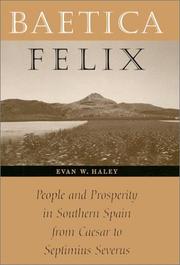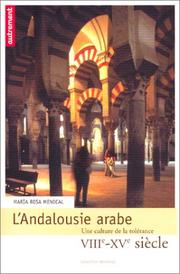| Listing 1 - 2 of 2 |
Sort by
|

ISBN: 0292734646 0292797796 Year: 2003 Publisher: Austin : University of Texas Press,
Abstract | Keywords | Export | Availability | Bookmark
 Loading...
Loading...Choose an application
- Reference Manager
- EndNote
- RefWorks (Direct export to RefWorks)
Baetica, the present-day region of Andalusia in southern Spain, was the wealthiest province of the Roman Empire. Its society was dynamic and marked by upward social and economic mobility, as the imperial peace allowed the emergence of a substantial middle social and economic stratum. Indeed, so mutually beneficial was the imposition of Roman rule on the local population of Baetica that it demands a new understanding of the relationship between Imperial Rome and its provinces. Baetica Felix builds a new model of Roman-provincial relations through a socio-economic history of the province from Julius Caesar to the end of the second century A.D. Describing and analyzing the impact of Roman rule on a core province, Evan Haley addresses two broad questions: what effect did Roman rule have on patterns of settlement and production in Baetica, and how did it contribute to wealth generation and social mobility? His findings conclusively demonstrate that meeting the multiple demands of the Roman state created a substantial freeborn and ex-slave "middle stratum" of the population that outnumbered both the super-rich elite and the destitute poor.
Land settlement --- Social structure --- History --- Andalusia (Spain) --- Economic conditions. --- Social conditions. --- Civilization --- Roman influences. --- Organization, Social --- Social organization --- Anthropology --- Sociology --- Social institutions --- Resettlement --- Settlement of land --- Colonies --- Land use, Rural --- Human settlements --- Andalucía (Spain) --- Andalousie (Spain) --- Andalusien (Spain) --- Autonomous Community of Andalusia (Spain) --- Communauté autonome d'Andalousie (Spain) --- Comunidad Autónoma de Andalucía (Spain) --- Baetica (Spain) --- Junta de Andalucía (Spain) --- Andalus (Spain) --- Bética --- Al-Andalus

ISBN: 2746703688 9782746703681 Year: 2003 Volume: 92 Publisher: Paris : Editions Autrement,
Abstract | Keywords | Export | Availability | Bookmark
 Loading...
Loading...Choose an application
- Reference Manager
- EndNote
- RefWorks (Direct export to RefWorks)
Dans l'Espagne médiévale, les musulmans, les juifs et les chrétiens ont su inventer la tolérance. La culture andalouse de cette période est celle des mélanges, une société prospère et riche de splendeurs, où dialoguent et circulent des idées, des textes, dans des langues elles-mêmes métissées. Maria Rosa Menocal retrace l'histoire de l'Andalousie entre le VIIIe et le XIIIe siècle, à partir de « motifs », ou figures remarquables : poètes, troubadours ou philosophes, intellectuels, hommes de sciences et politiques ; le « joyau du monde » c'est aussi les palais, les bibliothèques ou les jardins, les mosquées et les synagogues. Le rayonnement de cette civilisation et les relations qu'elle développa avec l'Europe et le bassin Méditerranéen se trouvèrent stoppées par la montée de l'intolérance religieuse, l'avènement de la peste noire ; dans une violence extrême, les autodafés marquèrent la destruction des trésors d'al-Andalus. Ce récit nous invite à envisager l'histoire des influences intellectuelles européennes d'une autre façon, notamment les relations entre Orient et Occident. Maria Rosa Menocal montre que cette formidable période fait résolument partie de notre héritage culturel et sans doute de notre avenir, jusqu'à Paris, Alexandrie, Sarajevo... les contours du monde occidental se trouveraient ainsi redessinés.
Religious tolerance --- Christians --- Jews --- Muslims --- Tolérance religieuse --- Chrétiens --- Juifs --- Musulmans --- History --- Histoire --- Spain --- Espagne --- Civilization --- Religion --- Civilisation --- Tolérance religieuse --- Chrétiens --- History. --- Toleration --- Andalusia (Spain) --- Arab influences. --- Christians. --- Civilization. --- Jews. --- Juif. --- Muslims. --- Religions --- Toleration. --- Tolérance --- chrétien --- culture --- musulman. --- tolérance --- vie culturelle. --- époque musulmane. --- Relations. --- Juif --- Musulman --- 17e s --- Vie culturelle --- 711-1516. --- Al-Andalus --- Andalousie (Espagne) --- Europe --- Europe. --- Spain. --- Civilisation. --- Relations interethniques. --- Influence islamique. --- Relations --- Influence arabe. --- Influence espagnole. --- Andalousie (espagne) --- 711-1492 (periode arabe)
| Listing 1 - 2 of 2 |
Sort by
|

 Search
Search Feedback
Feedback About UniCat
About UniCat  Help
Help News
News